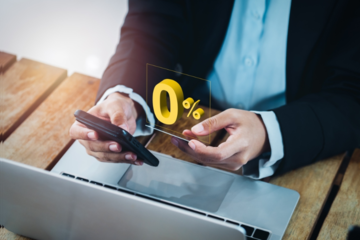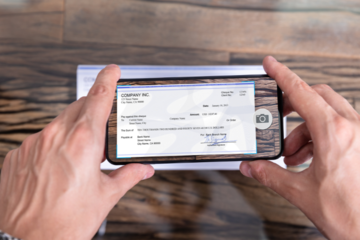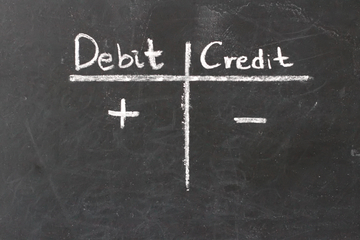Whether it's for a car repair bill, emergency room visit, or home repairs, it's critical to have emergency savings. If you don't have sufficient emergency savings, you may need to apply for a loan to cover the shortage. Fortunately, today's lenders can quickly deposit loan proceeds into your checking account in as little as 24 to 48 hours. But what happens if you don't have a bank account? Can you find personal loans with no bank account? Are cash advances available to those without bank accounts? Read on to learn more about getting a personal loan or cash advance without a bank account.
Key Takeaways
- While you may be able to find loans with no bank account, these loans tend to be more expensive.
- Lenders often use your bank account activity and history to verify your ability to repay your loan.
- Whether you have a bank account is typically not a factor in whether you can get a credit card cash advance. However, most lenders require bank accounts as a condition of credit card application approval.
- If you are unable to open a checking account, you should find out why and clear up the issue.
Cash Advance vs Personal Loan
Two common options for accessing cash are cash advances and personal loans. Let's explore each.
What Is a Personal Loan?
A personal loan is an installment loan where you receive a lump sum of money and agree to repay it through regular fixed monthly installments over a designated time frame. There are two broad categories of personal loans:
- Secured personal loans
- Unsecured personal loans
With an unsecured personal loan, there are no assets required as collateral for approval. If you fail to make payments or default on the loan, you will face credit implications. On the other hand, secured loans, such as car loans and home mortgages, utilize an underlying asset for your approval. This asset could be a car, a house, or any other valuable property that you, the borrower, owns. The lender uses this asset as a form of security, meaning that if you default on the loan (i.e., fail to make the required payments), the lender has the right to seize the asset, sell it, and use the proceeds to recover the amount lent. This is why it’s called a “secured” loan - the loan is secured by the asset. If you default on a secured loan, you will face credit implications and potentially lose the underlying asset.
Whether it's secured or unsecured, lenders tend to consider the following criteria to approve a personal loan:
- Credit history and credit score
- Income or your ability to repay the loan
- Additional capital that can help you repay the loan, such as investments, savings, and other assets
What Is a Cash Advance?
If you have a credit card or charge card and need fast cash, you may be able to take a cash advance. A cash advance is a withdrawal of cash from your credit card account or line of credit. While credit card advances may be fast and easy, there may be additional costs to consider:
- Additional transaction fees: Credit card cash advances typically have higher transaction fees.
- Higher APR: Cash advances will usually have a special APR that is higher than credit card purchases.
- No grace period: Cash advances will start accruing interest as soon as you withdraw the funds, which means there is no grace period.
Why Do Lenders Require a Bank Account for Loans?
When applying for a loan, it's common for lenders to request your bank account information. Most lenders view your bank account as a piece of your financial puzzle, helping them determine your ability to repay what you borrow. The absence of a bank history can complicate the lender's assessment of the risk involved in lending to you. Additionally, a growing number of lenders only use electronic deposits for the loan proceeds. If you do not have a checking or bank account, you may be unable to receive the loan proceeds from the lender.
Can I Get a Personal Loan Without a Bank Account?
While many lenders will require you to have a bank account for loan approval, you may be able to find loans with no bank account. However, these no-bank account types of loans tend to have higher fees and be more expensive. The most cost-efficient course of action is to simply open a checking account at a bank. If you have mismanaged your previous checking accounts, look for banks that offer second-chance checking accounts. Second-chance checking accounts are designed to help those who may have a negative banking history or have a negative reference in ChexSystems or another agency.
ChexSystems is a bank reporting agency or credit bureau that collects information about deposit accounts. According to a report, over 80% of banks and credit unions use consumer reports from agencies like ChexSystems to approve or deny bank applicants. The information you may find in your ChexSystems report includes:
- Suspected identity theft or fraud
- Unpaid negative balances
- ATM or debit card abuse
- Overdrafts and bounced checks
- Involuntary account closures
- Number of accounts recently applied for
If a ChexSystems report is preventing you from opening a checking account, access your report and rectify any issues preventing you from opening a checking account. You are entitled to access a free ChexSystems report every 12 months.
Can I Get a Cash Advance Without a Bank Account?
While it is possible to obtain a credit card cash advance without a checking account, the reality is that most financial institutions are hesitant to extend a line of credit without the security of an associated checking account. In essence, if you manage to secure a credit card without a checking or savings account, you can potentially access a cash advance.
Loan Options If You Don't Have a Bank Account
If you don't have a bank account and need cash, consider the following potential sources of funds:
Friends and Family
Whether it's your mother, father, aunt, sibling, or friend, loved ones are often a source of funds without many of the requirements and costs of traditional lending sources. However, borrowing from friends and family is not without its risks, as you can jeopardize that relationship if you aren't able to pay your loved ones back.
Peer-to-Peer Lending
Peer-to-peer (P2P) lending is a modern lending approach where individuals, often investors, lend money to borrowers and receive compensation. Managed online, P2P lending operates independently of traditional bank accounts. Examples include digital wallets, mobile payment apps, and cryptocurrency platforms, providing diverse options for those without access to or a preference for traditional banks.
Personal Loans
As previously mentioned, there are options for loans with no bank account. However, no bank account loans and bad credit personal loans tend to have higher interest rates and more fees. Even so, you may decide that the benefits of bad credit personal loans outweigh the costs of title loans and pawnshop loans.
Payday Loans
Whether you live paycheck to paycheck or have a one-time need, payday loans may be a viable option. Payday loans are short-term loans that provide you with cash until your next payday, which is when the loan is usually due. At this time, the entire amount borrowed with interest and fees will be due. Because of this, payday loans are typically issued in smaller amounts, such as $500 or less.
Title Loans
Title loans are short-term loans that are secured by your vehicle's title. With a title loan, you give the lender the title to your vehicle to receive loan proceeds. While you can continue driving the vehicle, the lender retains your title until the loan is paid.
Title loans can be costly and may result in you losing your vehicle if you fail to make payments. Make sure you understand the ramifications of this financial instrument.
Pawn Shop Loans
Pawnshop loans are almost identical to title loans. Instead of the title to your vehicle, you use an item as collateral to secure the loan. Common types of collateral can include:
- TVs
- Jewelry
- Musical instruments
- Video game consoles
With a pawnshop loan, the lender or pawnshop will assess the value of the collateral, which may be significantly less than what it's worth. The amount you can borrow is based on the collateral's appraised value. Many pawn shops will only lend 25% to 60% of the collateral's resale value. If you fail to repay your loan and fees, the pawn shop broker can keep your collateral and resell it to recover their losses.
Sources
- Five Cs of Credit - What Lenders Look For - Wells Fargo
- What Is Peer-to-Peer Lending and How Does it Work? | Credit Karma
- What Is Chexsystems & What Does It Show? | Intuit Credit Karma
- What is a cash advance and how do they work?
- Are Pawn Shop Loans Safe? | Rocket Loans
- Are Pawn Shop Loans Safe? | Rocket Loans
- What Is a Pawnshop Loan? - Experian
- Blocked by ChexSystems? What to Know - NerdWallet
- What Are Payday Loans? | Rocket Loans



